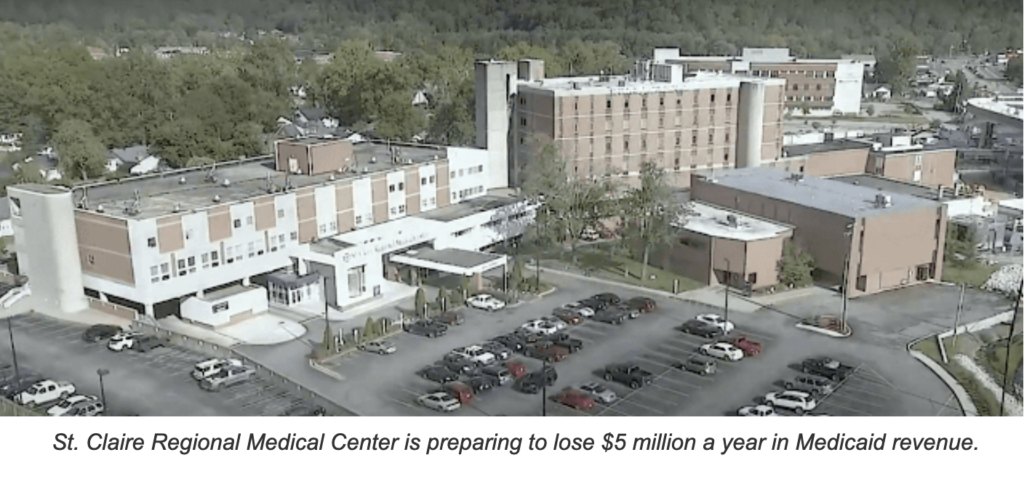Hospitals and health clinics prepare to take a post-pandemic hit as Medicaid drops people who no longer qualify for the program

By Casey Quinlan
States Newsroom
Donald Lloyd, CEO and president of St. Claire HealthCare in Morehead, has spent more than a year dealing with higher costs for food and medical supplies for his regional hospital.
Now he’s trying to prepare for another financial hit — the loss of Medicaid reimbursements for treating people in rural Appalachia.
“We are all being forced to try to eke out a sustainable margin because of those (inflation) factors,” Lloyd said. “And then with the potential loss of reimbursement for those who did qualify, that’s just going to add an additional layer of burden upon rural institutions.”
Lloyd is referring to the unwinding of a policy that began in 2020 as a response to the public-health emergency created by Covid-19. The Families First Coronavirus Response Act required states to allow Medicaid recipients to stay enrolled even if they were no longer eligible. That requirement ends April 1, and about 260,000 Kentuckians are expected to lose Medicaid coverage.
Health-care officials across the country are worried about how the loss of those Medicaid reimbursements will affect their facilities’ financial health.
The loss is expected to be particularly hard on rural hospitals, which generally operate in areas with higher poverty rates and serve an older population and people with lower incomes — all factors that contribute to the financial pressure on hospitals.
A report from George Washington University said in January that up to 2.5 million patients of community health centers, could lose coverage as a result of eligibility re-determinations.
Family Health Centers in Louisville plans to cut back on the low-cost or free medical, dental, behavioral health and pharmacy services it has been offering to uninsured patients because of the expected revenue dip, according to the Louisville Courier-Journal.
The Kaiser Family Foundation estimates that between 5 million and 14 million people will lose their coverage, and that two-thirds could be uninsured for several months up to a year.
That could cause problems for those “who delayed care because they lose their coverage and they’re coming in when they have a more severe situation,” said Carrie Cochran-McClain, chief policy officer at the National Rural Health Association.
Simple mistakes in paperwork could result in many people losing Medicaid even though they’re still eligible for it, said Leighton Ku, professor and director of the Center for Health Policy Research at GWU. “We still expect there’s going to be some increase in the number of uninsured people in the U.S. over the next year, no matter how hard we try, so hospitals and community health centers are going to have some rough times ahead,” he said.
Lloyd said he expects less than 3,000 people would lose coverage in the communities that St. Claire serves, which could cost the hospital about $5 million in Medicaid revenue.
The hospital is preparing for the decrease by slowing down its capital investments even though it needs to replace operating room tables and to repair and do maintenance on a wing built in the 1960s, he said. St. Claire is also looking at “reprioritizing” a number of strategic growth projects,” Lloyd added, such as accommodating robotic surgery.
He said the hospital has benefited greatly from Kentucky’s expansion of Medicaid under the 2010 Patient Protection and Affordable Care Act.
Before coming to St. Claire, he was president and CEO at Christus Health Southwest Louisiana. Louisiana expanded Medicaid in 2016 and Kentucky in 2014.
“There was greater access to care and a greater sustainability to the hospitals post-expansion, both in Louisiana and here in Kentucky,” Lloyd said. “We’ve just been very fortunate in the commonwealth that we’ve had a Medicaid expansion longer than some of the other states that were kind of slow to expand … It’s just a matter of economics, and even though in some states the gap between the actual cost of care and the Medicaid reimbursement is very significant, at least it does offset some of the expense of operations.”
A new payment model that became effective in January could keep some rural hospitals from closing, but they could keep patients no more than 24 hours, couldn’t have more than 50 beds, and would have to meet other eligibility requirements.